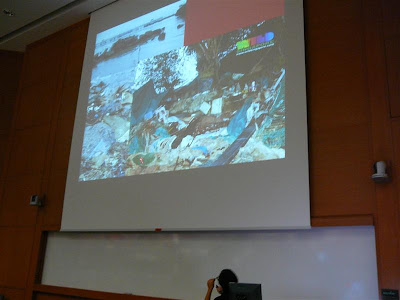
Dr Lim Han She from the Department of Geography, National University of Singapore, kindly invited Ria Tan to share with her 'Biophyiscal Environment of Singapore' class about the living shores of Singapore. Interestingly Ria calls herself a shore freak and Dr Lim calls herself a water freak (since she is a hydrologist). Dr Lim introduced to the class that coasts are important physical entity to Singapore because we are living on an island.
Most Singaporeans would think that we have no nice reef or wild marine life and when they think of Singapore's seashore or coast, the sanitized white sandy Siloso Beach type of coast comes to their mind. And funnily when we think of marine creatures, seafood relates to us the most.

The talk went on to introduce to around 450 undergraduates an eye-opening presentation of the different shores in Northern (from Chek Jawa to Changi to Beting Bronok etc) and Southern shores (from Hantu to Sentosa to Kusu to Labrador and many more) where everyone was very surprised to see we have pristine reefs and beautiful marine creatures they never imagined can be found right at our doorstep. The above slide showed everyone that even the tourist island, Sentosa, is home to a spectacular array of living creatures including the thick growth of corals that you can visit free of charge just outside the Underwater World.

The session was interactive and the whole class was engaged as they marvelled at our very own natural heritage that they don't even know existed. Ria shared on the threats of every shore including this sea anemone that has a little nemo living in it. It's now already buried for the development of the Sentosa Integrated Resort.


Undergraduates gets to see the state of our last remaining rocky shore in mainland Singapore and all the stress it has to take. This changes the perspective of us that we have to see these threats for ourselves and speak up to do something about it. Explore, express and act.

The class was captivated by the hundreds of photos screened on the slides.
Towards the end of the talk, it was the Q & A session where students raised some of their queries. The questions are interesting and below are some of them :-)
How many new species have you found?
Mostly like no as it's rare, but new records yes.
Chek Jawa do we need to swim or dive?
No, you can explore during low tide without getting wet.
Is it possible for reclaimed area good areas to generate reefs?
It take a long time but the best thing is to leave it alone.
Do we have any reef restoration programme
It's better to stop damaging in the first place rather than restore after the damage.
Is there anyway we can go these shores on our own?
Yes, like Chek Jawa boardwalk is now open daily. Refer to wildsingapore.com for more details.

At the end of the talk, we got everyone to do the traditional happy pose that we usually do on the shore group photos. And its wonderful to see such a big group of people excited.
Have a group of people and want to invite speakers to give a talk? Refer to the IYOR 2008 blog for more details.
Wow. It's great that Ria got to share with so many NUS students. Took this module before but never had such a lecture like this. :)
ReplyDeleteOther than to thank Ria for the great talk that left deep impressions, got to thank Dr Lim Han She, who took over the module as Dr Lu is away for sabbatical. She was looking into inviting someone to share with the class that we have rich nature spots in Singapore. And Ria answered the call. :)
ReplyDelete